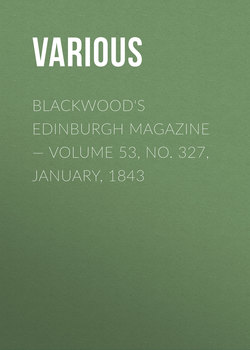Читать книгу Blackwood's Edinburgh Magazine — Volume 53, No. 327, January, 1843 - Various - Страница 2
LESURQUES; OR, THE VICTIM OF JUDICIAL ERROR I.—THE FOUR GUESTS
ОглавлениеOn the 4th Floréal of the 4th year of the Republic, one and indivisible, (23d April 1796,) four young men were seated at a splendid breakfast in the Rue des Boucheries at Paris. They were all dressed in the costume of the Incroyables of the period; their hair coiffés en cadenettes and en oreilles de chien, according to the fantastic custom of the day; they had all top-boots, with silver spurs, large eyeglasses, various watch-chains, and other articles of bijouterie; carrying also the little cane, of about a foot and a half in length, without which no dandy was complete. The breakfast was given by a M. Guesno, a van-proprietor of Douai, who was anxious to celebrate the arrival at Paris of his compatriot Lesurques, who had recently established himself with his family in the busy capital.
"Yes, mon cher Guesno," said Lesurques, "I have quitted for ever our good old town of Douai; or, if not for ever, at least until I have completed in Paris the education of my children. I am now thirty-three years of age. I have paid my debt to my country by serving in the regiment of Auvergne, with some distinction. On leaving the ranks I was fortunate enough to make my services of some slight use, by fulfilling, gratuitously, the functions of chef de bureau of the district. At present, thanks to my patrimony and the dowery of my wife, I have an income of fifteen thousand francs (L.600) a-year, am without ambition, have three children, and my only care is to educate them well. The few days that I have been at Paris have not been wasted; I have a pretty apartment, Rue Montmartre, where I expect to be furnished, and ready to receive you in my turn, with as much comfort as heartiness."
"Wisely conceived," interrupted one of the guests, who, till this moment, had maintained a profound silence; "but who can count upon the morrow in such times as these? May your projects of peace and retirement, Monsieur, be realized: if so, you will then be the happiest man in the Republic; for during the last five or six years, there has been no citoyen, high or low, who could predict what the next week would decide for him."
The speaker uttered this with a tone of bitterness and discouragement which contrasted strangely with the flaunting splendour of his toilet, and the appetite with which he had done honour to the breakfast. He was young, and would have been remarkably handsome, had not his dark eyes and shaggy brows given an expression of fierceness and dissimulation to his countenance, which he vainly endeavoured to hide, by never looking his interlocutor in the face. His name was Couriol. His presence at this breakfast was purely accidental. He had come to see M. Richard, (the proprietor of the house where M. Guesno alighted on his journey to Paris, and who was also one of the guests,) just as they were about to sit down to table, and was invited to join them without ceremony.
The breakfast passed off gaily, in spite of the sombre Couriol; and after two hours' conviviality, they adjourned to the Palais Royal, where, after taking their café at the Rotonde du Caveau, they separated.
